Germany’s Necessary Nuclear Debate

Germany’s two most recent foreign ministers, Frank-Walter Steinmeier and Guido Westerwelle, both made a point of demanding the removal of US nuclear weapons stationed in Germany. In 2009, Steinmeier argued that the system of nuclear deterrence had become “ineffective, risky, and irresponsible” and that US nuclear weapons on German soil were “obsolete militarily.” At the time, demands like this were politically non-costly since they were in line with the majority of German public opinion and uttered against the backdrop of the United States’ rock-solid security guarantees. Germany could rid its soil of nuclear weapons while relying on the US to defend it if push came to shove. With Donald Trump’s ascendance to the US presidency, this cozy state of affairs is over. Trump has called into doubt US commitments to NATO allies; where there once were unconditional guarantees, today there is at best conditional protection. All the lip service that US Secretary of State Rex Tillerson will likely pay to the value of the transatlantic alliance at the G‑20 meeting in Berlin next week, and any warm words offered by US Vice President Mike Pence and Secretary of Defense James Mattis at next week’s Munich Security Conference, will not change that. Until US voters unequivocally reject Trump’s “America First” ideology at the ballot box, Germany (alongside European allies) needs to fundamentally rethink its security. Germany must do contingency planning for a possible future in which the Trump approach proves to be a plausible stance adopted by US administrations in the coming decades. Germany’s new foreign minister Sigmar Gabriel seemed to imply as much when he stated that the “security guarantee of the US for Europe is a post-WW II model that now runs out with a bit of delay.”
The often invoked Friedensmacht Deutschland, or “peace power Germany,” feels naked without security guarantees. The lessons from the Ukraine experience should be clear. The country forewent nuclear weapons in favor of the security guarantees of the Budapest Memorandum, only to discover they were not even worth as much as the paper they were written on when Russia chose to invade Crimea. How does Germany want to face a newly aggressive Russia that is rapidly modernizing its nuclear arsenal (and other potentially aggressive nuclear powers)? Wolfgang Ischinger, head of the Munich Security Conference, warns against a “dangerous” debate on nuclear strategy in Germany. His statement echoes the prevailing opinion of the German public, which prefers to dream of “Global Zero” rather than face vexing strategic realities head on.
Yes, any debate on nuclear strategy should proceed with great caution and care, but it is one Germany cannot and should not avoid. Those rushing to argue that Germany needs to quickly acquire nuclear weapons disregard the need for caution and care. Yes, Germany should preserve its latent capability to build nuclear weapons. But a German bomb can only be the last resort in case of a total breakdown of the Euro-Atlantic security arrangements. By acquiring nuclear weapons, Germany would violate its commitments within the Nuclear Non-Proliferation Treaty (NPT) and the 2+4 Treaty governing German reunification. A European nuclear umbrella, as demanded by Polish governing party leader Jarosław Kaczynski this week, is not in the cards politically at this stage. But that does not mean that Germany should not push in this direction. The UK as a nuclear power should remain an integral part of European security after Brexit. The decisive factor is France and its force de frappe. Should Marine Le Pen fail with her bid to move into the Élysée Palace, Germany should seek talks on nuclear cooperation with the new French president in May. Approaching Paris on an issue where Germany is needy would also help to put Franco-German relations on a more equal footing – a more than welcome side effect.
…
This is an English version of a commentary originally published in German by Wirtschaftswoche on February 10, 2017.







